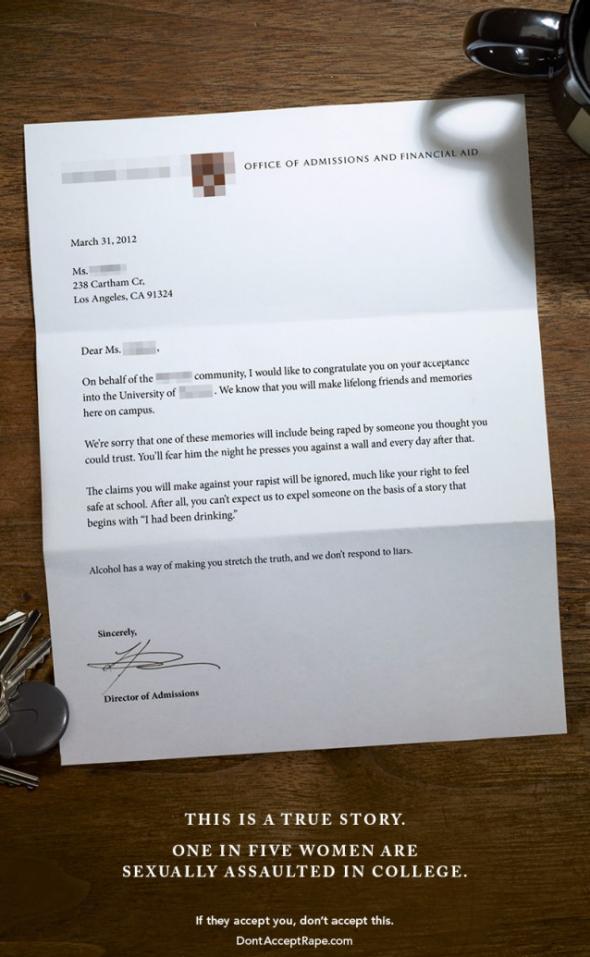A new ad campaign is targeting college-bound high school seniors, encouraging them to consider their prospective schools’ sexual assault records before accepting admissions offers. The campaign began with a print ad that ran in the Harvard Crimson on Saturday: a fake acceptance letter from a university admissions director who promises “lifelong friends and memories here on campus,” including “being raped by someone you thought you could trust.”
The ad ran during Harvard’s accepted-students weekend, an event that brings hundreds of prospective Harvard students to campus before they decide which college to attend this fall. It relays a disturbing account of a student abandoned by a university administration after reporting a rape. “You’ll fear him the night he presses you against a wall and every day after that,” the fake letter reads. “The claims you will make against your rapist will be ignored, much like your right to feel safe at school.”
Ad agency Goodby Silverstein & Partners teamed up with Prettybird, a production company whose credits include Beyoncé’s “Formation” video, for the campaign, which includes the print ad, a website, a series of videos, and a letter from sexual assault survivor Wagatwe Wanjuki in USA Today. GS&P creative director Margaret Johnson said the ads are directed at incoming first-year students before they even set foot on campus because the first six weeks of college are when they’re most likely to experience a sexual assault.
On one hand, this kind of shock-value messaging is a perfect way to garner the attention of teens who might not think the issue applies to them. Few high schools mandate curricula on sexual violence, and this campaign could help fill an awareness gap among new college students who don’t know how to identify or report a rape. The ads also call attention to a few misconceptions about rape—that the only victims are women, for instance—and the victim-blaming rhetoric universities propagate to avoid responsibility for campus sexual assault and get out of lengthy legal battles. “You can’t expect us to expel someone on the basis of a story that begins with ‘I had been drinking,’ ” says the admittance letter in the ad. “Alcohol has a way of making you stretch the truth, and we don’t respond to liars.” Then, lest viewers dismiss the account as mere marketing narrative, it yells in all caps, “THIS IS A TRUE STORY.”
This messaging is utterly terrifying, and it may do more to make incoming students feel helpless and vulnerable than empower them to demand change from a university at which they haven’t yet matriculated. It’s hard to overstate the severity of our country’s campus sexual assault crisis, especially when it seems like advocates will never be able to provide enough proof to convince those who dismiss the existence of a pervasive rape culture. But this campaign comes close to crossing that line, portraying sexual assault as a foregone conclusion for first-years.
In a series of lo-fi videos modeled after live recordings of teens opening college acceptance letters, the campaign presents worst-case scenarios like tragic fortune cookies. “You will be sharing dorms with repeat sexual offenders,” one young woman reads after opening the envelope with her ecstatic parents. “You will be raped in your first semester and as a result attempt to end your own life the next,” reads another. A male student finds out he’s getting an athletic scholarship; his prospective school writes him, “We know that you will make us proud, especially when you witness a girl being raped by our star quarterback and don’t report it—team players keep their mouths shut.”
A call to action on the campaign’s website asks viewers to send a form email to their colleges to “demand accountability.” The message tells school administrators to name “confidential advisors” for victims of sexual assault, train all campus employees to respond to sexual assaults, launch a public survey of the student body on sexual violence, and “listen and be responsive” to what survivors say they need. This is all good stuff, though it’s unlikely that any university will take a clicktivism campaign from high-school seniors any more seriously than existing demands from current students, alumni, and an increasingly horrified public.
It’s hard to know how teens will react to hearing the video’s recommendation to “prepare for a challenging year ahead, which includes losing your virginity to a rapist,” a few months before leaving home for a strange new place, or whether they’ll be impelled to anti-rape activism by being told, “You will be taken to the basement and violently raped, becoming his third victim. We will only suspend him for a single day; then you’re on your own.” If this campaign helps any wide-eyed first-year recognize sexual violence and institutional incompetence when she sees it, I’d count it as a win. But its real potential for power might lie in incoming students’ parents, who make cameos in the campaign’s videos. They cheer their children on, ready to send them to schools promising to ignore their rape allegations and protect their assailants. In one of the video’s most chilling moments, a dad of a high-school senior exclaims “You’re next!” from behind the camera to an even younger daughter. High-school students can choose to reject an admissions offer from a school with a poor sexual assault record, but parents can use their phone books and checkbooks as leverage, too.
